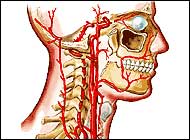Stroke may accelerate dementia progression
Stroke may influence the expression of dementia and Alzheimer’s disease, according to findings from two studies appearing in the most recent issue of the journal Neurology.
Dr. Ciaran Regan, from the Royal Free & University College Medical School in London, and colleagues analyzed data from 224 patients with Alzheimer’s disease to test the hypothesis that vascular risk factors are associated with a worse prognosis.
The subjects were drawn from a long-term study of Alzheimer’s disease that took place over 18 months. The patients were evaluated with standard measures of thinking (cognition), functioning, and neuropsychiatric symptoms during follow-up.
In general, the presence of vascular risk factors, such as diabetes and smoking, did not increase the rate of cognitive deterioration in the study group, even after accounting for other potential risk factors, such as years of education and medication use. However, such factors were associated to cognitive decline in patients who experienced a stroke during follow-up.
“Vascular risk factors may contribute to the expression of Alzheimer’s disease initially, but are not part of the underlying…process,” Regan’s team concludes.
In the second study, Dr. Richard J. O’Brien, from the Johns Hopkins Bayview Medical Center in Baltimore, and colleagues assessed the impact of stroke on the risk of dementia in 335 older adults. The subjects were an average age of 75 years old and were followed, on average, for 10 years. 
The cumulative risk of stroke by age 90 in the study cohort was 15.4 percent, the report shows. Subjects with stroke were 5.55-times more likely to develop dementia than those without stroke.
Further analysis showed that most patients with dementia after a stroke actually had mild cognitive impairment prior to their cerebrovascular event. In these subjects, stroke increased the likelihood that such impairment would become dementia by 12.4-fold. By contrast, stroke did not increase the risk of dementia in subjects without mild cognitive impairment beforehand.
In other words, the researchers conclude, “dementia after stroke may be determined by cognitive impairments that exist prior to stroke.”
SOURCE: Neurology 24, 2006.
Revision date: June 22, 2011
Last revised: by Janet A. Staessen, MD, PhD